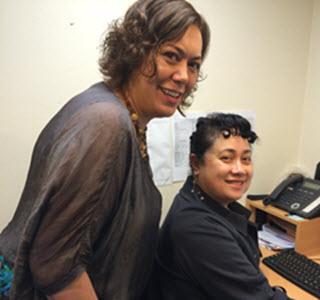- Home
- News
- Screening Matters, Issue 47, August 2014
- Innovative approach increases cervical screening numbers
News
- Screening Matters Newsletter
- April 2019
- April 2018
- December 2017
- August 2017
- April 2017
- December 2016
- October 2016
- March 2016
- November 2015
- August 2015
- June 2015
- April 2015
- February 2015
- December 2014
- October 2014
- August 2014
- June 2014
- April 2014
- February 2014
- December 2013
- October 2013
- August 2013
- June 2013
- April 2013
- February 2013
Screening Matters
The National Screening Unit newsletter
In this issue:
- New Zealand’s approach to equity in screening interests NHS
- September is Cervical Screening Awareness Month!
- Innovative approach increases cervical screening numbers
- New breast screening provider in the south
- New appointments for BreastScreen Aotearoa
- Keeping ahead of advances in screening
- Declining a smear or withdrawal from the NCSP
- New framework for equitable health care for Māori
- Loud Shirt Day
Innovative approach increases cervical screening numbers

The Fono included a $10 per patient payment for smear taker nurses for every unscreened or overdue woman they screened at their Henderson clinic once they exceeded 20 smears per month.
The Fono, which is an affiliation between West Fono Health Trust, Pasifika Horizon Healthcare and The Peoples Centre Trust, delivers health services to around 15,000 Pacific and high-needs people across Auckland.
Senior Manager Services Sally Dalhousie says 573 patients of its Henderson clinic were unscreened or overdue for their cervical smears at the beginning of 2014, a large number of whom were priority women.
She says there was recognition by both community services and clinical staff that a concerted, collaborative effort was needed to improve the situation.
While The Fono took a whole-of-practice approach, the initiative was predominantly led by the clinic’s smear taker nurses rather than the GPs. Health care assistant Aivi Puloka drove the project by cleaning up and updating patient data and encouraging the nurse smear takers to be opportunistic about smear taking when seeing patients.
‘One of the challenges of a practice like ours is that our patients tend to have complex and high needs and, unfortunately, cervical screening can be at the bottom of the list of all the things a nurse or GP needs to cover with them in a 15-minute consultation,’ says Sally.
The incentive payment initiative was extended from an initial three-month period to five months. Five hundred of the women who were unscreened or overdue were screened over the period.
Sally says the initiative’s success means an incentive payment may well be part of an overall strategy to improve The Fono’s screening rates in the future.
‘We have four clinics across Auckland and we’re looking at supporting our other clinics to do something similar, although their numbers of overdue smears are much lower.’
‘We’re also looking at other strategies to improve our cervical screening rates and ensure that regular cervical screening becomes business-as-usual for our patients and staff.’
To receive the Screening Matters newsletter by email, fill out our sign-up form.

